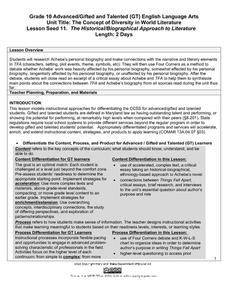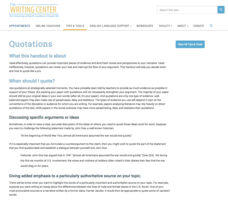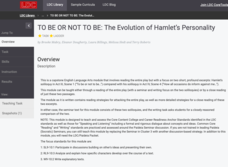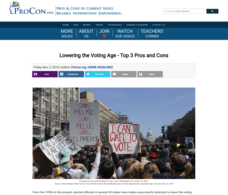Curated OER
Persuasive Speech Assignment
Practice using concrete evidence from various sources to back up an argument. The lesson emphasizes the use of support in a persuasive speech, as well as the importance of appealing to an audience's logic and emotions. You could modify...
ConnectED
Crime Scene Investigation
How exactly does a crime scene investigation work? The resource, a unit on criminology, covers everything from the deductive reasoning skills needed for detectives to DNA fingerprinting, all the way to how to gather evidence and bring...
iCivics
So You Think You Can Argue
What defines an argument, and how can someone properly formulate a counterargument? This resource provides two options—an interactive PowerPoint presentation or worksheet—that will support your learners as they begin to explore how to...
Maryland Department of Education
The Concept of Diversity in World Literature Lesson 11: The Historical/Biographical Approach to Literature
How affected is Thinks Fall Apart by Chinua Achebe's personal biography? Using a four corners strategy, and evidence from their readings, class members debate the degree of biographical influence in Achebe's novel.
Maryland Department of Education
The Concept of Diversity in World Literature Lesson 1: Unit Introduction
To launch a unit study of the concept of diversity in World Literature, class members compare Chinua Achebe's essay, "An Image of Africa: Racism in Conrad's Heart of Darkness" and Richard Rodriguez's essay, "The Chinese in All of Us: A...
EngageNY
Grade 9 ELA Module 2, Unit 2, Lesson 7
The accusations begin in Sophocles' Oedipus the King, with troublemakers and enemies abound. As learners delve deeply into the sights unseen, they review textual evidence from their readings to write about the importance of timing in the...
EngageNY
Grade 9 ELA Module 2, Unit 2, Lesson 11
Close readers and forensic detectives alike deal with collecting strong evidence. Ninth graders become involved in an instructional activity about Sophocles' Oedipus the King, in which they find connections between Oedipus' stated words...
EngageNY
Grade 9 ELA Module 3, Unit 1, Lesson 4
Can dogs feel shame? Explore the anthropomorphic connection between human emotions and animal behavior—or lack thereof—with a lesson about Temple Grandin's book, Animals in Translation. Ninth graders continue a close reading of chapter...
EngageNY
Grade 9 ELA Module 4, Unit 1, Lesson 18
As first-year students continue to investigate how sugar changed the world, the focus shifts to a consideration of why people with limited job options take on dangerous or subjugating work. Class members read an opinion piece by Nicholas...
EngageNY
Grade 9 ELA Module 4, Unit 1, Lesson 25
After analyzing the strengths and weaknesses of the evidence they have recorded on their argument outline tool, writers draft their essay's first body paragraphs, ensuring they have properly cited their source material.
University of North Carolina
Quotations
According to A.A. Milne, "[A] quotation is a handy thing to have about, saving one the trouble of thinking for oneself." However, as part of a larger series of handouts discusses, quotations also have the ability to enhance a piece of...
University of Pennsylvania
Mock Trial of Alfred Dreyfus
What if scholars based mock trials on history? The fourth installment of a five-part series on the Dreyfus Affair asks learners to read various pieces of evidence before conducting a mock trial for a French officer. Teams answer...
Curated OER
Turning Assets into Action in the Fight Against Hunger
How can one person change the world? Scholars research and analyze the topic of world hunger. Using video clips, parodies, and primary source evidence, they uncover a current campaign to end world hunger. Collaborative groups openly...
Literacy Design Collaborative
To Be or Not to Be: The Evolution of Hamlet’s Personality
How does Hamlet's state of mind change over the course of Shakespeare's most famous revenge tragedy? After a close reading of Hamlet's soliloquies in Act III, scene 1 and Act IV, scene iv, class members engage in a Paideia/Socratic...
ProCon
Video Games and Violence
Is screen time dangerous time? Scholars take a close look at the facts surrounding video games and violence. Pros give evidence connecting violence to video games while cons suggest there is no relationship.
ProCon
Voting Age
Should age matter when it comes to voting? Scholars read an article discussing the pros and cons of lowering the voting age to 16. They then consider both the advantages and disadvantages of having younger voters. After thinking about...
ProCon
Voting Machines
Does technology always mean advancement? Scholars take a close look at the use of voting machines. Does using a machine make voting more effective? Readers consider the advantages and disadvantages of the current voting process. They...
Franklin D. Roosevelt Presidential Library & Museum
Pearl Harbor Activity #4: Who is the Audience?
Young historians use the prompts on a worksheet to analyze President Roosevelt's "Day of Infamy" speech. They identify the intended audience for the speech, the devices FDR used to persuade his audience, the responses promoted, and the...
Street Law
Mock Trial - Brooks v. Lawrence and the Metro City Police Department
An incident with a Swiss Army knife leads to a suit against the police department for battery, false arrest, and intentional infliction of emotional distress in the Brooks v. Lawrence & the Metro City Police Department mock trial...
EngageNY
Grade 9 ELA Module 2, Unit 3, Lesson 12
As the first in a two-part, end-of-unit assessment that encourages readers to synthesize the unit's main ideas, class members review their notes for each of the three texts they read and develop three open-ended discussion questions...
EngageNY
Grade 9 ELA Module 2, Unit 3, Lesson 13
Using the open-ended discussion questions developed the day before, class members engage in a fishbowl discussion of the three texts that anchor the unit: “True Crime: The Roots of an American Obsession," “How Bernard Madoff Did It,” and...
EngageNY
Grade 9 ELA Module 4, Unit 1, Lesson 20
After comparing the working conditions of the enslaved people to those of the Indian indentured workers on the sugar plantations, class members examine the conditions and the actions of specific historical figures that Marc Aronson and...
University of North Carolina
Clichés
When it comes to writing, cliches are as old as dirt. A handout on tired phrases provides examples of cliches, as well as a description of the negative effects they have on a paper. Writers discover specific words and phrases to avoid,...
EngageNY
Grade 9 ELA Module 2, Unit 2, Lesson 8
Prophecy and blindness often go hand in hand, as in Sophocles' Oedipus the King. Explore Oedipus' thoughts about prophecy, fate, and responsibility with an activity focused on the discussion between Creon and Oedipus regarding the murder...
Other popular searches
- Evidence of Evolution
- Evidence for Evolution
- Citing Textual Evidence
- Textual Evidence
- Evidence for Plate Tectonics
- Supporting Evidence
- Continental Drift Evidence
- Archaeological Evidence
- Dna Evidence for Evolution
- Cite Evidence in Text
- Evidence for Geologic Time
- Indirect Evidence

























